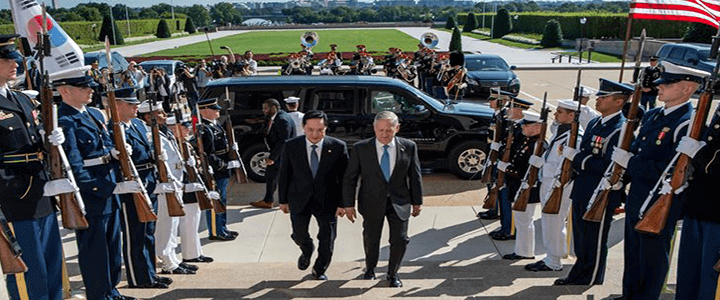The past few days have been — even by the new standards established by the Trump administration — strange. The smoldering feud with North Korea had seemed to be on a bit of a hiatus. The DPRK had conducted no rogue missile tests or new nuclear detonations. The triple Harvey-Irma-Maria hurricane wallop, the NFL controversy, and the unspeakable horror of Las Vegas kept the news cycle bust with things not Korean.
Then came accusations that Secretary of State Rex Tillerson had called the president “a moron,” to which Tillerson gave a non-denial denial (He denied he was thinking of leaving the administration, but did not address whether or not he had ever said such a thing. Translation? He said it).
Say what?
When the nation’s senior military leaders, and their spouses, came calling on the White House Thursday night, the president raised the world’s collective eyebrows. The White House had specifically asked the press corps to cover the event, and they dutifully complied. But between a photo-op and moving into the State Dining Room, the president asked the assembled reporters and photographers, “You guys know what this represents? Maybe it’s the calm before the storm.”
When pressed for clarification, the president merely responded with a coy, “You’ll find out.” The only ones who were more anxious to discern the president’s meaning than the Washington press corps were the North Koreans. The president undoubtedly increased the anxiety level in Pyongyang Saturday when in a series of tweets he said, “Presidents and their administrations have been talking to North Korea for 25 years, agreements made and massive amounts of money paid… hasn’t worked, agreements violated before the ink was dry, makings fools of U.S. negotiators. Sorry, but only one thing will work!”
Sen. Corker, who recently announced he will not seek reelection in 2018, responded to these comments in a Sunday morning tweet of his own. While those inside the Beltway were watching the Sunday morning talk shows, Corker said “It’s a shame the White House has become an adult day care center. Someone obviously missed their shift this morning.”
Early Monday morning, after spending a chunk of his time Sunday attacking Corker, the president reiterated his comments on North Korean policy, tweeting, “Our country has been unsuccessfully dealing with North Korea for 25 years, giving billions of dollars & getting nothing. Policy didn’t work!”
what’s really going on?
Speaking at the annual Association of the U.S. Army annual meeting Monday, Secretary of Defense James Mattis dialed the rhetoric back, saying ““It is right now a diplomatically, economic-sanctions-buttressed effort to try and turn North Korea off of this path,” but telling the Army its job was to be ready to respond to the president’s decisions, whatever they may be.
I believe this is all a ruse designed to observe and measure North Korea’s reactions. Ahead of the Battle of Fallujah in 2004, a Marine public affairs officer told reporters that major military operations had begun in his sector. The media took this to mean that the offensive had begun, and reported as much. But the larger offensive had not begun, and would not begin for several days. But the reporting allowed the Marines to observe the movement of civilians and insurgents inside Fallujah and fine-tune their plans accordingly.
I’m convinced that the U.S. is no closer to war with Korea than we have been for some time. But I am also convinced that some smart intelligence analysts who haven’t seen daylight in a long time now have reams of satellite imagery and signals intelligence that give them a picture of how the North Korean military is reacting to threatening language. Every day that passes without actual escalation solidifies this view.
Tuesday marked the anniversary of the 1945 founding of the Communist Party in Korea. The DPRK has been known to celebrate with a missile test. They didn’t do that this year. All the bluster might actually be working.




